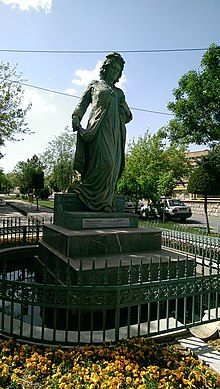fiction.wikisort.org - Writer
Mah Sharaf Khanom Mastoureh Ardalan or Mastura Ardalan (1805, Sanandaj − 1848, Sulaymaniyah) was a Kurdish poet, historian, and writer.
Mastoureh Ardalan | |
|---|---|
 A statue of Ardalan in Sanandaj, Iran. | |
| Born | Mah Sharaf Khanom Mastoureh Ardalan 1805 Sanandaj, Qajar Iran |
| Died | 1848 (aged 42–43) Sulaymaniyah, Ottoman Iraq |
| Occupation | Writer, poet, philosopher, historian |
| Spouse | Khosro Ardalan |
| Children | 1 |
| Parents | Abulhassan Beig (father) |
Biography
Ardalan was born in Sanandaj eastern Kurdistan/Iranian Kurdistan and died in Sulaymaniyah southern Kurdistan/Iraqi Kurdistan. She was a member of the feudal aristocracy in the court of the Ardalan principality centered in Senna. She studied Kurdish, Arabic and Persian under the supervision of her father, Abolhasan Beig Qadiri. Her husband, Khasraw Khani Ardalan was the ruler of the principality. Her husband's death left the principality vulnerable to outside interference. When the Qajar state conquered the Ardalan territory in the 19th century, she and her family left for the Baban principality centered in Sulaymaniyah. Her son, Reza Qulikhan, the successor to Khasraw Khan, was imprisoned by the Qajars.[citation needed]
Works
She wrote several books of poetry, history and literature. She mainly wrote in the Hawrami or Gorani dialect of Kurdish and in Persian, but she has a few poems in Central Kurdish as well.[1] Most her Kurdish poetry was forgotten during the 20th century and was rediscovered and published by the end of 20th and the beginning of 21st century.[2] She was a poet and said to be the only woman historiographer of the Middle East until the end of the nineteenth century. She wrote a book about the history of the Kurdish Ardalan dynasty. She also wrote a collection of poems, which has been republished in recent years.
Legacy
Her 200th birthday was celebrated recently in a festival in Hewler (Erbil), in the Iraqi Kurdistan region, where her statue was unveiled in a ceremony. A conference was held on the works of Mastoureh in Erbil from 11 to 15 December 2005. Over one hundred scientific and cultural figures from across the world attended the congress in Iraqi Kurdistan, in which thirty articles in Kurdish, Persian, English, and Arabic were presented about the life and works of Mastoureh Ardalan.[clarification needed] In addition, several of her works were published by the organizers in Persian and Kurdish during the congress.[citation needed]
A statue of Ardalan by Iranian sculptor Hadi Zia-dini now stands in Sanandaj, Iran.[3]
Books
- Khronika Doma Ardalan: Ta'rikh-I Ardalan by Mah Sharaf Khanum Kurdistani and E. I. Vasileva, ISBN 5-02-016559-X / 502016559X
- Divan-i Masturah Kurdistani, Collection of poems, 238 pp., 1998, ISBN 964-6528-02-3.
References
- ماھشەرەف خانمی ئەردەڵانی (خەنسای کورد)، دیوانی مەستوورە، لێکۆڵینەوەی: محەممەد عەلی قەرەداغی، ھەولێر: دەزگای چاپ و بڵاوکردنەوەی ئاراس، چاپی یەکەم ٢٠١١.
- "KURDISH WRITTEN LITERATURE – Encyclopaedia Iranica". iranicaonline.org. Retrieved 4 March 2021.
- "City of Statues". ISNA. 24 December 2018. Retrieved 20 March 2019.
Sources
- Some of the Kurdish Poems of Mastura Ardalan
- Mastura Mâh-Sharaf Khâtun in Kurdish Literature
- Mastura Kurdistani, by Shahla Dabbaghi, in Kurdish
- About the Mastura Commemoration Congress in Irbil
- Woman poet statue set up in Irbil, Hewler Globe
На других языках
- [en] Mastoureh Ardalan
[fr] Mastoureh Ardalan
Mah Sharaf Khanom Mastoureh Ardalan ou Mastura Ardalan (1805-1848) est une poétesse, historienne et écrivaine kurde. Elle est la seule historiographe du Moyen-Orient connue jusqu'à la fin du XIXe siècle.Другой контент может иметь иную лицензию. Перед использованием материалов сайта WikiSort.org внимательно изучите правила лицензирования конкретных элементов наполнения сайта.
WikiSort.org - проект по пересортировке и дополнению контента Википедии